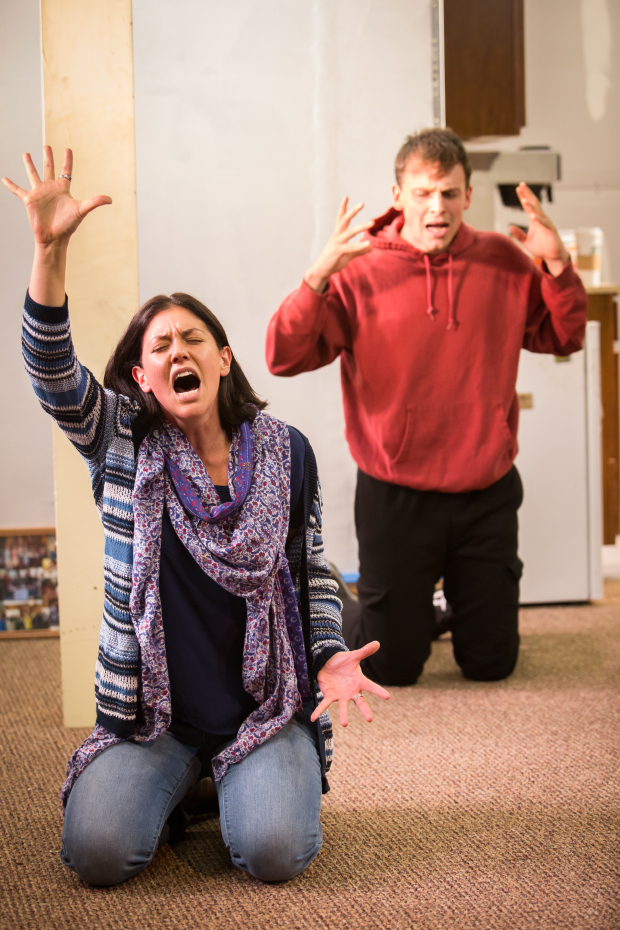The Harvest
Samuel D. Hunter’s new play explores a crisis of faith in a small church basement in Idaho.

(© Jeremy Daniel)
The opening second of Samuel D. Hunter's The Harvest is seemingly ordinary. The lights rise on a group of twentysomethings praying. Very quickly, however, something distinctly unusual happens: They are overcome by the spirit and begin speaking in tongues. In Hunter's magnificent new play, directed by his frequent collaborator Davis McCallum for LCT3, glossolalia is the only way that these young people can truly express themselves. When one of them starts to have a crisis of faith on the eve of a missionary trip, his life is thrown for a loop that has the power to do serious damage.
Set in a nondescript church basement, The Harvest is the story of Josh (Peter Mark Kendall), a man with nothing left to lose. His abusive father is recently deceased, but their relationship was strained to the point that Josh would sleep in a tent outside rather than in their house. In the wake of his father’s passing, Josh and his friends prepare for a journey to the Middle East, where they'll spread the word of Jesus Christ. Everyone else will stop over for four months, but Josh plans to stay indefinitely.
The group's leader, Ada (Zoë Winters, hilariously severe), describes Josh as their mascot. His best friend, Tom (Gideon Glick), senses that a one-way ticket isn't the answer to Josh's problems, including a fear that he has promised to spend his life serving a God that hasn't made any sort of appearance, even though God is supposedly speaking through him. When Josh's absent sister, Michaela (Leah Karpel), arrives on the scene and learns of her brother's plan to flee, she takes it upon herself to save Josh the way he's intending to save others.
Hunter possesses an uncanny ability to create characters for which we feel empathy. Similarly, over the past half-decade, Hunter has become the theater's premiere chronicler of the ways religion can simultaneously uplift and discourage the most vulnerable. As deep as his beautiful heartbreakers like A Bright New Boise and The Whale have managed to go, The Harvest displays an even more profound maturity on Hunter's part, in terms of both plot and character development, and the unspoken nuances.
With astutely unifying direction from McCallum, Hunter and the performers also do an uncommonly good job of fleshing out all of the supporting roles, giving seemingly extraneous characters as much as weight as the protagonists. To wit, Madeleine Martin and Christopher Sears find humor and overwhelming sadness as an expectant yet clearly unsatisfied married couple, and Scott Jaeck provides an appropriate amount of menace as the church's pastor.
Glick's performance is especially beautiful as he plays up the subtext and repression of Tom's relationship with Josh (there is, perhaps, an unexpressed crush that impacts the way Tom exists). Karpel exudes sympathy as a woman in the process of finding her way after being lost for so long. But the play really belongs to Kendall, a young actor of astonishing intensity and truthfulness, who leaves himself dangling off the cliff of despair in hopes of a rescue. The performers are aided by a nondescript but entirely lived-in set by Dane Laffrey, appropriately workaday costumes by Jessica Pabst, and authentically harsh lighting by Eric Southern.
While a very late-in-the-game twist doesn't necessarily suit the piece as a whole, it is grounded enough in the uncommon reality that Hunter and McCallum create that it is easily forgivable. The Harvest's examination of this crop of missionaries on spiritual journeys and self-quests of their own is a reminder that faith doesn’t come easily, no matter where you look for it.








